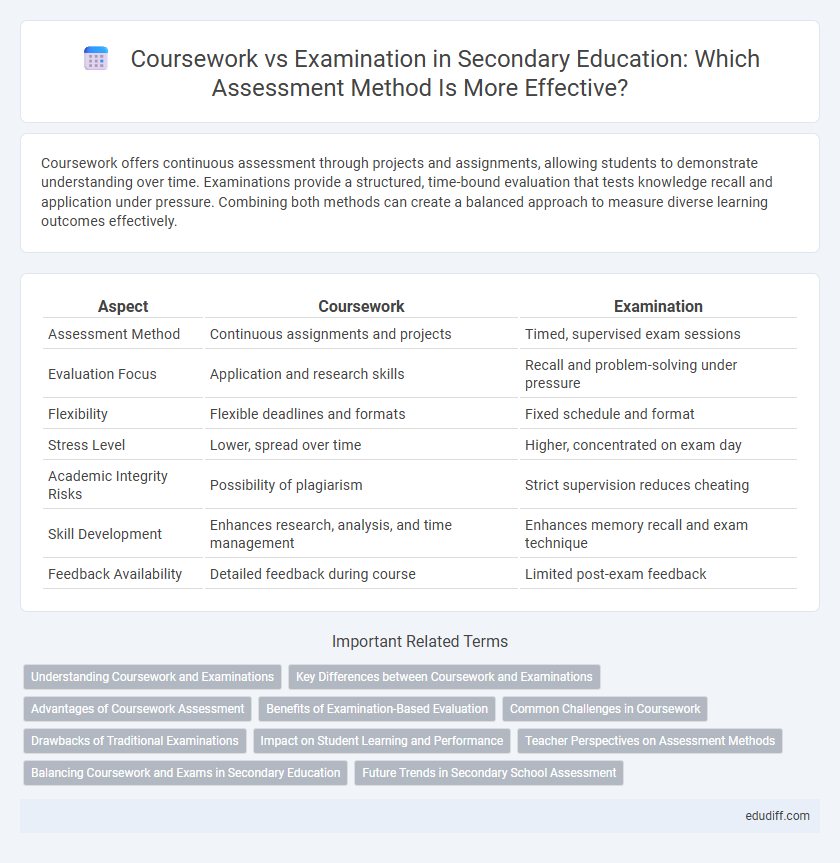Coursework offers continuous assessment through projects and assignments, allowing students to demonstrate understanding over time. Examinations provide a structured, time-bound evaluation that tests knowledge recall and application under pressure. Combining both methods can create a balanced approach to measure diverse learning outcomes effectively.
Table of Comparison
| Aspect | Coursework | Examination |
|---|---|---|
| Assessment Method | Continuous assignments and projects | Timed, supervised exam sessions |
| Evaluation Focus | Application and research skills | Recall and problem-solving under pressure |
| Flexibility | Flexible deadlines and formats | Fixed schedule and format |
| Stress Level | Lower, spread over time | Higher, concentrated on exam day |
| Academic Integrity Risks | Possibility of plagiarism | Strict supervision reduces cheating |
| Skill Development | Enhances research, analysis, and time management | Enhances memory recall and exam technique |
| Feedback Availability | Detailed feedback during course | Limited post-exam feedback |
Understanding Coursework and Examinations
Coursework provides continuous assessment through projects, essays, and assignments, allowing students to demonstrate comprehension and application of knowledge over time. Examinations test a student's ability to recall and apply information under timed conditions, emphasizing memory and quick problem-solving skills. Both methods evaluate understanding, but coursework encourages deeper engagement, while exams assess performance under pressure.
Key Differences between Coursework and Examinations
Coursework involves continuous assessment through assignments, projects, and presentations, allowing students to demonstrate understanding over time, while examinations test knowledge in a limited time frame under controlled conditions. Coursework encourages in-depth research, critical thinking, and practical application, whereas examinations primarily assess memory recall and time management skills. The key difference lies in the assessment format, with coursework offering a more comprehensive evaluation of a student's abilities compared to the high-pressure, summative nature of exams.
Advantages of Coursework Assessment
Coursework assessment promotes deeper understanding by encouraging continuous learning and application of knowledge over time, rather than relying on a single exam performance. It allows students to develop research, analytical, and time-management skills essential for academic and professional success. Furthermore, coursework can accommodate diverse learning styles, providing a more comprehensive evaluation of a student's abilities.
Benefits of Examination-Based Evaluation
Examination-based evaluation offers an objective measure of student knowledge and understanding in secondary education, enabling standardized comparison across diverse cohorts. It promotes time management and critical thinking skills under timed conditions, essential for academic and professional success. This method also provides immediate feedback for both students and educators, supporting targeted learning interventions and performance improvements.
Common Challenges in Coursework
Common challenges in secondary school coursework include managing time effectively, meeting diverse assignment requirements, and mastering subject-specific skills. Students often struggle with balancing coursework alongside other responsibilities, leading to incomplete or rushed submissions. Furthermore, varying assessment criteria and inconsistent feedback can hinder academic progress and motivation.
Drawbacks of Traditional Examinations
Traditional examinations often fail to accurately assess a student's comprehensive understanding and critical thinking abilities, leading to a narrow evaluation of knowledge. Time constraints and high-pressure environments can cause anxiety, impairing performance and not reflecting true capability. Furthermore, exams typically emphasize rote memorization, neglecting practical skills and creativity essential for real-world applications.
Impact on Student Learning and Performance
Coursework promotes continuous assessment, enabling students to develop critical thinking and time-management skills through regular assignments and projects. Examinations emphasize memorization and time-constrained performance, often increasing stress and reducing opportunities for deep understanding. Combining both methods can balance formative feedback with summative evaluation, enhancing overall student learning and performance outcomes.
Teacher Perspectives on Assessment Methods
Teachers often view coursework as a more comprehensive assessment method that allows for ongoing evaluation of student understanding and skills development. Examinations are typically considered effective for testing knowledge retention under timed conditions, but may not fully capture a student's critical thinking or practical abilities. Educators emphasize balancing both methods to cater to diverse learning styles and provide a holistic picture of student achievement in secondary education.
Balancing Coursework and Exams in Secondary Education
Balancing coursework and examinations in secondary education enhances student learning by promoting continuous assessment alongside evaluated knowledge retention. Integrating regular coursework enables students to develop critical thinking and time management skills, while exams provide standardized measurement of academic achievement. Schools that effectively blend these assessment methods support improved academic performance and holistic student development.
Future Trends in Secondary School Assessment
Future trends in secondary school assessment emphasize a balanced integration of coursework and examination methods to holistically evaluate student learning. Coursework fosters critical thinking, creativity, and ongoing skill development, while examinations provide standardized measures of knowledge retention and application under timed conditions. Advances in digital assessment tools and adaptive testing are expected to enhance the accuracy and personalization of evaluations, supporting diverse learner profiles and preparing students for higher education and career challenges.
Coursework vs Examination Infographic

 edudiff.com
edudiff.com